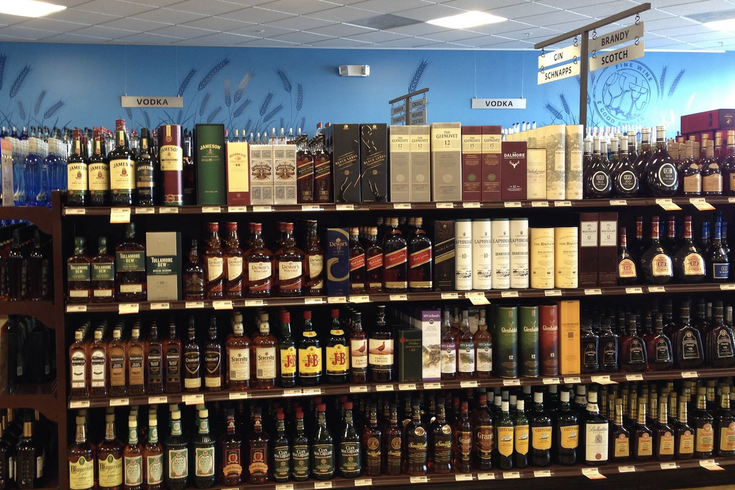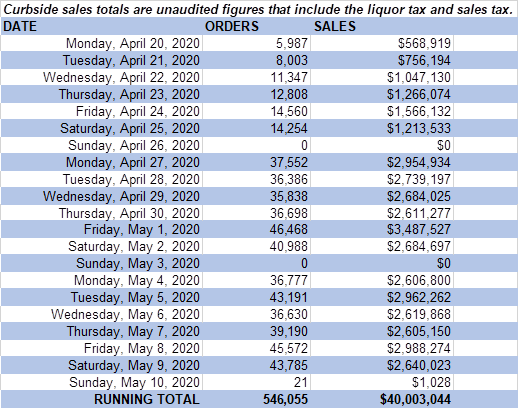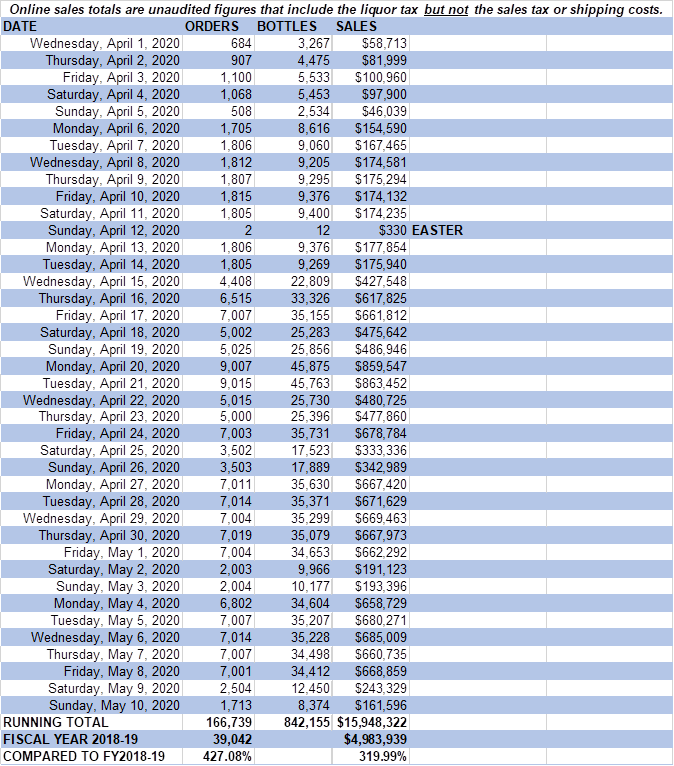
May 11, 2020
 @PAWINESPIRITS/Facebook
@PAWINESPIRITS/Facebook
Fine Wine & Good Spirits has made progress in restoring business through online and curbside sales in Pennsylvania, but the hamstrung PLCB's state-run system is again in the crosshairs for reform during the coronavirus pandemic.
Pennsylvania residents saw major improvements in April to operation of the state's Fine Wine & Good Spirits stores, whose closures during the COVID-19 crisis have made purchasing liquor and wine an added frustration of the lockdowns.
After the limited online order platform was expanded early last month, the state gradually introduced curbside pickup at more than 560 stores across Pennsylvania.
Sales figures since the introduction of these measures show that the Pennsylvania Liquor Control Board has been able to recoup a chunk of the business lost during the state's stay-at-home order. Here's a look at both online sales and curbside pick-up sales (data provided by the PLCB):
Curbside liquor and wine sales, April 20-May 10, 2020.
Onine sales at Fine Wine & Good Spirits, April 1-May 10, 2020.
Late last month, PennLive reported that the PLCB is facing a net loss of about $47 million in sales as a result of the COVID-19 pandemic. It would be much worse if the state did not see a pickup in sales to licensees such as a restaurants and wine shops.
Year-over-year statistics provided to PhillyVoice show that total sales fell from $194,649,201.16 in April 2019 (13,979,306 units) to $84,665,307.16 in April 2020 (6,635,909). Online sales increased from $352,926.15 in April 2019 (12,082 units) to $10,323,414.39 in April 2020 (549,970 units).
Before the pandemic, a typical day's worth of transactions would amount to approximately 180,000 sales. Last Friday, the combined online and curbside orders reached about 52,000 transactions.
As highlighted last week by Forbes, pressure is mounting again for the state to take another look at reform. Estimates cited there put the PLCB's losses closer to $200 million in less than two months.
Regardless of the timeframe for the reopening of Pennsylvania’s government-run liquor stores, the pandemic-driven shutdown has increased pressure to reform the state government’s liquor monopoly.
“It definitely creates more heat in the kitchen of privatization," Senator Pat Stefano (R-Fayette County) said. Senator Stefano, who chairs the Senate Law and Justice Committee, calls the current monopoly system “inadequate at best.”
Senator Stefano is far from the only Pennsylvania lawmaker who predicts an increased interest in either privatization or PLCB reform that reduces state government’s involvement in the liquor business. Such reform could be done in a manner that raises needed revenue for state coffers without raising taxes.
Pennsylvania House Majority Leader Bryan Cutler (R-Lancaster County) added that lost revenue will become more apparent and more pressing when it's time to propose a budget.
The last attempt to privatize the state liquor system came in 2015, when Gov. Tom Wolf vetoed full privatization but agreed to allow wine and beer to be sold in licensed grocery and convenience stores. A similar push could be made to extend spirits sales to these businesses.
As at least 24 counties enter the yellow phase of Pennsylvania's reopening, the PLCB could see some recovery of sales if the stores in those counties are deemed ready to open.
"The PLCB continues to monitor the situation and work with the Wolf Administration and public health officials to determine when it is safe to take the next step in our operations," a spokesperson said.
While it isn't the most pressing matter for legislators during the COVID-19 crisis, new momentum for liquor reform is building as the pandemic lays bare the limitations of the state-run system.
 Source/PLCB
Source/PLCB Source/PLCB
Source/PLCB